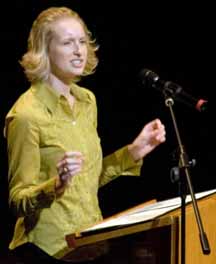Canadian Mennonite
Volume 10, No. 04
February 20, 2006

Spirit blesses Mount Royal retreat
Waldheim, Sask.
Our retreat committee agonized, stressed and lost sleep over this year’s retreat. We only had 30 people actually signed up when we had said 35 would be an absolute minimum. But there was some additional interest from our Colombian refugee families, so we went for it.
And the Holy Spirit blessed the venture in ways we could never have foreseen. In the end, more than 30 Colombian refugees came to the Shekinah Retreat Centre for at least part of the weekend, bringing the total number of participants to more than 60, about 20 of whom spoke little or no English.
Harold Peters Fransen led us in reflecting on how Jesus was a friend to others and what we learn from him about being friends—to each other and to outsiders. A study of four stories from the gospels showed that friendship means being approachable, accepting, compassionate and non-judgmental. Friends move past society’s barriers, notice what is needed, and bring words and actions together.
In his final exercise, Fransen divided us into four groups: young adults, Colombians, Africans and “older whites.” Each group identified where Mount Royal Mennonite Church (Saskatoon) cultures clash. The young adults mentioned openness to their type of music and more activities geared for them. The Colombians identified greater expressions of love, communication and teaching children respect for others. The African group mentioned movement and spontaneity in worship. The older whites identified a number of issues where there is tension in the church, including punctuality versus flexibility, consistency versus spontaneity, and commitment versus freedom.
Outdoor activities provided some magic moments. Seven-year-old Diego became acquainted with a frozen pond for the first time. “That’s water?” he asked, touching and tapping his foot and hand on the ice. “How deep?” And little Edwine, five, squealed with glee all the way down the luge run, breathlessly exclaiming, “Wanna go again, wanna go again.”
Vern Ratzlaff began the Sunday morning message with the thought that on Jan. 21, 1525—481 years ago to the day—the first Anabaptists were rebaptized into their new faith. How did they feel the next morning, as they had to begin the process of being church? How to do this is still a question for us today.
Ratzlaff led the group in a short study of church meetings in Acts. Out of these readings, he distilled his own 10 Commandments of Church business meetings:
• Membership is inclusive. All are listened to.
• The context is one of respect and warm hospitality.
• Agendas are simple and easy to understand.
• Specific stories are told to clarify any issues or problems.
• Biblical traditions are drawn on as illustrations, not as proof-texts.
• Beliefs and values shape decisions, and are shaped by them.
• Discernment of God’s leading is sought in silence, in listening and (almost a holy flippancy) in casting lots.
• Leaders gifted in discernment propose actions. Confirmation is given by the body in consensus.
• Prayer, worship and praise characterize the time together.
• Specific steps are planned to implement decisions.
As the worship wrapped up, a spokesperson for the Colombian families communicated heartfelt thanks for the friendship that had been offered through the weekend. “The people are happy!” said another.
—Mount Royal Mennonite Church release
Winning speech calls for lifting up those with learning disabilities
Goshen, Ind.
 |
What do Albert Einstein, Thomas Edison, Agatha Christie, Winston Churchill, Alexander Graham Bell, Walt Disney and Pablo Picasso have in common? They were all challenged to overcome learning disabilities—and succeeded.
In front of a crowd that filled Goshen College’s Umble Center, junior Rebecca Fast, a social work and theatre major from Waterloo, Ont., helped her audience connect to the issue of learning disabilities, the effects it has on society, and what is needed for those affected to succeed. And after a 45-minute wait for the judges’ verdict, she was named as the first-place winner in the 2006 C. Henry Smith Peace Oratorical Contest for her speech “Misunderstood minds: Wasted human potential.”
From Fast’s perspective, helping those with learning disabilities meet their potential is a significant peace and justice issue—one of the criteria for the competition—because of the fundamental understanding that all humans are created in the image of God.
“Most learning disabilities are not apparent to the outside observers and they cannot be catalogued by race, gender or religion,” Fast said. “Students with learning disabilities learn differently from their peers. Although they have average or even above-average intelligence, there is a discrepancy between their abilities and their actual achievement.… Sadly, people with learning disabilities that are not acknowledged, accommodated and taught properly, simply become invisible and disappear.”
Citing nationally cultivated statistics, Fast pointed out the correlation between learning disabilities and depression, anxiety, substance abuse and suicide. The labels that are often placed on those with learning disabilities—stupid, lazy, lacking motivation—are part of the destructive process, according to Fast.
“They not only devastate their fragile self-esteem, but as the statistics have demonstrated, too often become self-fulfilling negative prophecies,” she said. “I believe that our society must take responsibility for the failure to properly identify and accommodate people with learning disabilities in our educational system.”
Fast concluded by calling on the audience to no longer “waste the human potential” of so many fellow human beings, and start to advocate for the understanding of people with learning disabilities.
Fast is the daughter of John and Esther Fast, is a 2003 graduate of Rockway Mennonite Collegiate, Kitchener, Ont., and attends Erb Street Mennonite Church, Waterloo, Ont.
Participants competed for cash prizes and the top winner, Fast, may enter the U.S./Canada Mennonite Central Committee-sponsored C. Henry Smith Peace Oratorical Contest. The trust of C. Henry Smith, a Mennonite historian and professor at Goshen and Bluffton (Ohio) colleges, funds the contest, which gives students an opportunity to become involved with the peace cause while cultivating rhetorical skills.
—Goshen College release